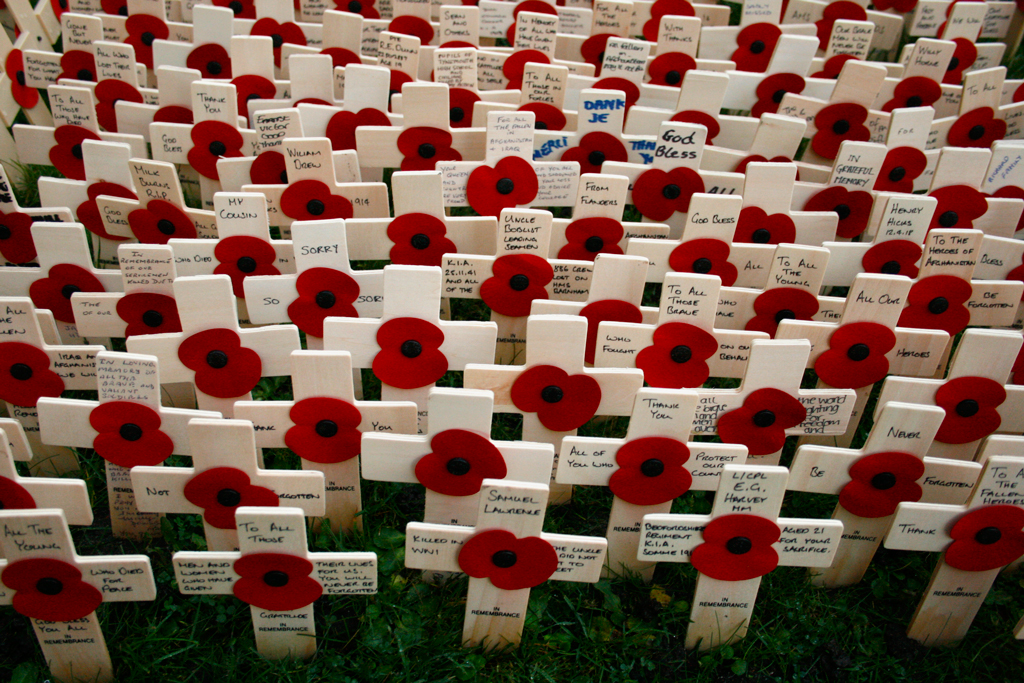November 11, 2015 marks the 97th anniversary of the armistice that concluded the First World War. On the eleventh hour of the eleventh day of the eleventh month, over four years of conflict ended, with over 10 million dead. The First World War was named “the Seminal Catastrophe” by American diplomat and historian George Kennan, who saw it is as the defining tragedy of the 20th century, if not modern history as a whole. In many ways, he was right: not only did the war lead to immense suffering for its duration, but the chaos it induced toppled states and ushered Fascist and Communist regimes into the world, regimes that would be at the center of the Second World War and the Cold War. The fighting over and partition of the Middle East after the First World War would lay the groundwork for conflicts there, arguably up to and including those we see today.
In 1983, on “Remembrance Day,” as November eleventh is called in most parts of the world, a famous Peanuts special debuted that, in the eyes of many, reflects simply and powerfully on the events of both world wars. In it, the familiar Peanuts characters explore France on their exchange trip. Each time they come to a historic site from one of the wars, Linus tells the story of what happened there so many decades ago. When they arrive at a battlefield in Flanders, Linus recites the first two stanzas of a World War One poem by Canadian solider John McCrae entitled “In Flanders Fields”: “In Flanders Fields/the Poppies blow/between the crosses, row on row/that mark our place, and in the sky/the birds still bravely singing fly/scarce heard amid the guns below/we are the dead, short days ago/we lived, felt dawn, saw sunset glow/ loved and were loved, and now we lie/ in Flanders Fields.” After this solemn recitation, Linus turns and simply asks, “What have we learned, Charlie Brown?”
This reflective, earnest, and respectful remembrance of the Seminal Catastrophe reflects how most of the world remembers the First World War: the day is a peaceful, solemn one, when moments of silence are held and people wear poppies to honor those who died. At the Tower of London, one can see hundreds of thousands of poppies fashioned from clay by hand, one for each of the British war dead. This monument clarifies the magnitude of the tragedy with a sea of red flowers flowing into the distance.
The United States of America does not give the day this respect, however. In the United States, “Veteran’s Day,” as it is known, is instead a day of patriotism, as is its parallel holiday in May, Memorial Day. In my own hometown of Hershey, Pennsylvania, there was a garish and boisterous parade to mark Memorial Day. The band played pop tunes and a float followed with a young boy, dressed as a soldier, marked “future defender of our freedom.” After the parade, many likely went off to partake in the sales many businesses were holding, and to wave their flags, just as they did on Veteran’s day. This sort of thing is frowned on in other parts of the world: in Canada, for example, Gap faced a considerable public backlash when they held a “Remembrance Day Sale.” Such events are rightly considered inappropriate.
The United States is not uniquely given to disrespect their war dead. Rather, we simply have a far different relationship with this history. In Canada, for example, where Gap was ridiculed, roughly 10 times the percentage of the population died in the First World War compared to America. In Australia, the proportion is even higher, and it is also very high in the United Kingdom. When the second war came, the United Kingdom would be devastated – to this day, bombs from World War II are occasionally found when foundations are excavated for new buildings in London – and although the United States would be attacked at Pearl Harbor, this country would once again escape the worst of the war’s terrors.
My concern is not that America’s dead are disrespectfully remembered, although this should be considered. My concern is that the cultural ethos surrounding war has not matured in the same way it has in those nations where everyone lost someone who mattered to them. The Canadian Prime Minister, for example, has just announced that his nation will no longer participate in air actions in Syria. This reticence may be incomprehensible to many Americans, but the reluctance Canada and others show with regards to war reflect a deeper respect for war and the risks it poses. To be sure, there are many political elements that keep Western powers back when America rushes in – one cannot gauge the hawkishness of a state from its body counts in previous wars alone – but perhaps if the United States bowed its head in silence on Remembrance Day instead of capitalizing on mattress sales on Veteran’s Day, then our political culture would be a little less eager to “cry havoc! And let slip the dogs of war.”




